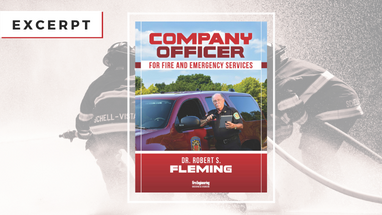May 31st 2024
Excerpt: Company Officer for Fire and Emergency Services
Book By Dr. Robert S. Fleming
Training and Mentoring ersonnel
Opening Scenario
Several months ago, Grant was appointed to his first company officer position within his fire department. This promotion came after 12 years of service as a firefighter. During that time, Grant had developed a true appreciation for the fact that the success of a company’s work at emergency incidents is based not only on the individual knowledge and skills of each company member, but equally on their ability to “put the pieces together” and function as a highly skilled, coordinated team.
Unfortunately, during his first few months as a station captain, he had developed some concern about the knowledge and skills of several company members, and great concern about the company’s ability to put it all together successfully at an emergency incident scene. While he had concerns about some of the specialized work that his company members seemed only marginally qualified to perform, his greatest concern involved the fact that most of his company’s calls involved routine fires in residences or businesses. He had also heard concerns from several chief officers about the preparedness of his company members and their performance at several recent incidents.
By his very nature, Grant was inclined to jump right in and point out how the knowledge or skill deficiencies of some members were affecting the company’s performance and reputation. Fortunately, he had the wisdom to think about the best way to handle this situation properly and promptly without alienating the majority of the members of his company. He took the time to empathetically consider this unacceptable situation from the perspective of his company members and to consider how he would want this situation to be addressed if he were one of those firefighters.
While he knew that timely action was necessary and would involve “back to the basics” training and practice, he recognized the importance of doing this in a manner that, while getting the job done, did not unduly offend the members of his company, particularly the ones that had taken their knowledge and skills maintenance seriously. Grant realized that there might be other officers who had experienced similar dilemmas and decided to reach out to a number of officers whom he respected and who had been his mentors.
Role of the Company Officer
Company training is an essential component of a fire department’s overall training activities. While the initial and continued training that fire department members receive will be centralized and fall under the responsibility of the department’s training officer, the responsibility for ensuring the continual preparedness of company members to effectively, efficiently, and safely enact their roles and responsibilities falls under the department’s company officers. Company officers provide training that complements training received during a recruit or fire academy class and addresses essential knowledge and skills such as the utilization of the specific apparatus and equipment assigned to a particular company. While such training is obviously essential at the time when a new member joins a company, it is also necessary as the company places in service new apparatus or equipment, or when changes in strategy, tactics, policies, and or procedures are implemented by the fire department.
Throughout this book we have reinforced the key role of the company officer in ensuring the life safety of all personnel assigned to their company. Safety is of paramount importance from the standpoint of company training. Company training must reinforce applicable safety issues and techniques in the preparation of company members who will have the necessary knowledge, skills, and attitudes to think and practice safety in all of their activities while responding to, operating at, and returning from emergency incidents. Knowledge, skills, and attitudes are the three domains of learning addressed through training and or educational programs. Company training must also result in safe work practices back at the fire station and certainly during training activities. It should be noted that each year firefighters across the nation suffer harm in terms of injuries or deaths resulting from training activities. The company officer must therefore ensure that appropriate safety practices are taught and enforced during training, and followed throughout the daily activities of each and every company member.
It is essential and certainly in the best interest of all involved, for a company officer to fully comprehend the knowledge and skills of each company member, in order to continue to support their professional development and to assist in making assignments on the scene of an emergency incident. Thus, an important component of the company officer’s responsibilities is conducting a needs assessment through which they identify the overall training needs of the company as well as the specific training needs of its various members. Once these training needs are understood, the company officer can ensure that they are addressed, whether through internal company training activities or the provision of outside training.
The company officer is also responsible for developing and implementing an appropriate training schedule for the company based on the needs analysis. Involving company members in the planning and delivery of training programs can be extremely beneficial in terms of motivating and empowering company members to share their expertise with their colleagues. Involving company members in these roles will likewise contribute to the development of a company that functions as a competent and effective organizational team.


